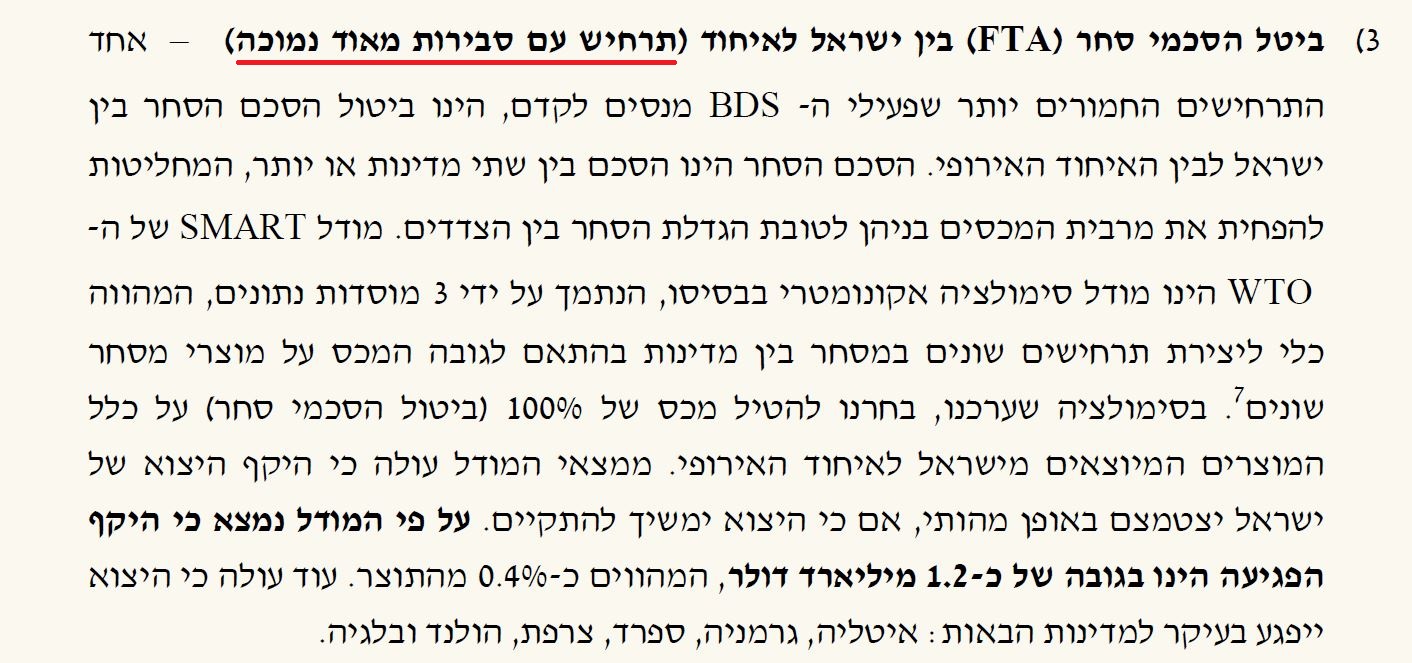British media reports about BDS often follow a familiar pattern.
First, they misleadingly characterize the movement as progressive, peaceful and merely focused on ending the occupation. Then, they prominently feature – and fail to critically examine – claims of victory made by BDS activists. Finally, they either downplay or completely ignore all counter evidence – statistics and other examples indicating that the boycott movement is not even minimally achieving its objectives.
The Financial Times (FT) – the British equivalent of the Wall Street Journal, which largely focuses on international business and economic news – is among those publications which follow this tendentious, propagandistic formula, one more befitting Electronic Intifada than a “serious” news site.
A recent article at FT (Israel, a new kind of war, June 12) by their Jerusalem correspondent John Reed begins with the following mischaracterization of the BDS movement:
Though a decade old, BDS’s message — that Israel should be isolated economically for its occupation of Palestinian lands — has appeared to come into its own in recent weeks. A series of votes by overseas groups condemning Israel and a high-profile flap between Prime Minister Benjamin Netanyahu’s government and Orange, the French telecoms group, have contributed to the sense that BDS is becoming a force to be reckoned with.
First, regarding Reed’s characterization of the aims of the movement, it needs to be stressed that most BDS advocates are not merely concerned with the Israeli “occupation of Palestinian lands.” In fact, BDS leaders have been quite open in their opposition to the continued existence of a Jewish state within any borders.
Second, Reed’s claim that BDS “is becoming a force to be reckoned with” is inadvertently undermined by the very example he uses – the “flap” between Netanyahu and Stephane Richard, the CEO of French telecom company Orange. Though the row began when Richard’s comments in Egypt earlier in the month were (falsely) interpreted as supportive of BDS, it ended with Richard traveling to Israel at the behest of Netanyahu, apologizing and clarifying that he “loves Israel, will continue to invest in the state and is “radically” opposed to BDS.
So, the example cited by Reed, to set the tone for his piece claiming a string of BDS victories, was actually not a BDS victory at all.
Reed then cites another “victory”:
Veolia Environment, the French infrastructure group, in April sold most of its Israeli holdings to a private equity group after campaigners criticised it for involvement in projects such as the Jerusalem tram line, which links the city’s Jewish west to a settlement.
First, the Jerusalem light rail line is not linked to a “settlement” as Reed claims. It’s linked to neighborhoods in east Jerusalem, including Arab neighborhoods.
Moreover, as this blog has noted previously, the claims that Veolia has divested from Israel appear to have little if any merit. Indeed, the Veolia narrative Reed is advancing is strikingly similar to an April post in Electronic Intifada (Under boycott pressure, Veolia dumps most Israeli businesses, April 8th).
As a report in the Israeli business magazine Globes noted at the time (Oaktree acquires Veolia’s Israel activities, April 1), what transpired was a business transaction, one which had nothing to do with BDS. Veolia’s Israeli activity was acquired by Oaktree Capital Management in conjunction with Veolia’s local management, led by Veolia Israel’s founder and chairman Uri Starkman. The article went on to note that Veolia has operated in Israel for over 20 years and plans to continue its investment in the state.
We also contacted Yoni Itzhak, spokesman for Veolia Israel, and asked him to comment on the Financial Times claims that the transaction in question was due to pressure from anti-Israel boycott activists.
Here’s a snapshot of my email:
Here’s a snapshot of his email reply:
Reed’s article continues with a claim regarding the estimated cost of BDS:
However, there are signs that Israel’s disquiet over BDS is genuine. This week an Israeli financial newspaper covered a leaked government report estimating that BDS could cost Israel’s economy $1.4bn a year. The estimate included lower exports from the settlements in keeping with the EU’s plans to begin labelling goods made there — not part of the BDS movement, although many Israelis lump the two things together.
The leaked Israeli government report Reed is referring to was reported by Calcalist (a financial paper owned by the Yedioth Ahronoth Group).
However, the government report in question continually notes that BDS has so far had very little, if any, negative impact on Israel’s economy. It then, however, speculates on different possible future scenarios and their possible effects. One of those scenarios imagines what would happen if the EU cancelled the Free Trade Agreement with Israel. The report speculates that, in that scenario, Israel’s economy would suffer losses of 1.2 billion USD. However, right next to the title of this scenario, it is stated (in the text underlined in red) that this is a “very low probability scenario“.
Reed then writes that “The Rand Corporation, the US think-tank, says the costs could be more than three times higher: $47bn over 10 years”.
However, this also is extremely misleading. The Rand Corporation report in question (page 87) cites the $47bn cost to Israel only in the context of a one out of many hypothetical scenarios – one in which Palestinians decide on a grand strategy which “eschew[s] violence” in favor of completely “nonviolent tactics”. First, it seems extremely unlikely that all Palestinian parties would ever abandon violence and adopt a such non-violent model. Additionally, Rand has acknowledged that “evidence on the effectiveness of sanctions is mixed, making an assessment of the potential economic effects of the BDS movement problematic.”
It’s also quite telling that, elsewhere in the article, Reed cites BDS leaders denying accusations that the movement to completely isolate the only Jewish state is antisemitic, while simultaneously including the following comment by one of the movement’s co-founders, Omar Barghouti:
The dimming of hope for a negotiated solution to end the Israeli-Palestinian conflict, BDS activists say, buoyed their argument that only concerted economic pressure on Israel will sway its actions. “We are winning the battles for hearts and minds across the world, despite Israel’s still hegemonic influence among governments in the US and Europe,” says Omar Barghouti, a Palestinian activist and co-founder of BDS.
Barghouti, in complaining of Israel’s “hegemonic influence” among the US and EU governments, is recycling familiar antisemitic tropes alleging Zionist control of Western foreign policy.
Finally, if Reed wanted to empirically examine the claims of victory by BDS activists he could have looked at Israeli exports to the European Union, which have doubled to $15.6 billion per year since the movement began in the mid 2000s, or foreign investment in Israel, which has similarly surged. Indeed, most tellingly, Israeli GDP has actually increased at a greater rate since the international BDS movement began than before the campaign.
Contrary to the impression created by Reed and his protagonists in his extremely misleading Financial Times report, BDS is not a progressive movement, isn’t winning “hearts and minds” and is failing to chalk up significant victories or harm Israel’s economy.







